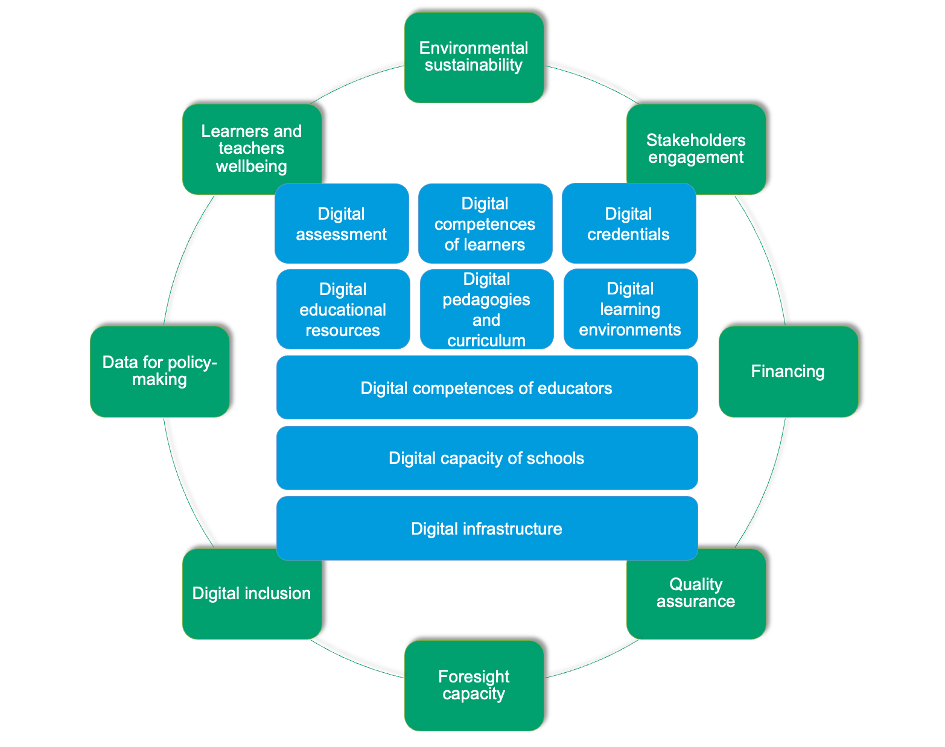The ETF Digital Education Reform Framework, developed within the Creating New Learning initiative, aims to support policy makers, in ETF Partner Countries and beyond, to design, implement and monitor effective and equitable digital education policies that are tailored to the dynamics and characteristics of contemporary digital ecosystems.
The framework details and connects the WHAT of digital education policies, meaning the possible focus areas of such initiatives, and the HOW of digital education, through some critical factors that need to be taken into account within sustainable and human-centric digital education initiatives.

The central part of the framework (in blue) is about the “What” of digital education and aims at presenting the different possible policy areas with examples of real-life initiatives, so that policy‑makers can learn from the experiences of other countries. The framework identifies nine areas that can be at the focus of specific digital education policies: Digital infrastructure, Digital competences of educators, Digital capacity of schools, Digital pedagogies and curriculum, Digital education resources, Digital learning environments, Digital assessment, Digital competences of learners and Digital credentials.
The outer part of the framework (in green) is about the “How” and outlines the main critical factors and the corresponding questions that may help policy-makers articulate key elements of digital education policies: Data for policy‑making, Digital inclusion, Stakeholders’ engagement, Financing, Quality assurance, Environmental sustainability, Teachers and learners wellbeing and Foresight capacity.
How is the Framework being used
The ETF Digital Education Reform Framework is currently being used to support digital education policy making in a number of national contexts.
 During 2023 and 2024, the DERF has been used to support the Government of Algeria in mapping the country developments in the field and in further planning digital education initiatives. The ETF has run an in-depth mapping of existing initiatives and developments in all areas of digital education, from infrastructure to teachers development to digital pedagogies and resources. This work culminated with a workshop in Algiers in February where the findings have been discussed with different stakeholders, representing evidence-based starting points for future initiatives in the field.
During 2023 and 2024, the DERF has been used to support the Government of Algeria in mapping the country developments in the field and in further planning digital education initiatives. The ETF has run an in-depth mapping of existing initiatives and developments in all areas of digital education, from infrastructure to teachers development to digital pedagogies and resources. This work culminated with a workshop in Algiers in February where the findings have been discussed with different stakeholders, representing evidence-based starting points for future initiatives in the field.
 In the same period, the DERF methodology has informed a set of ETF policy advice activities to the Ministry of Education of Moldova. Data was collected through an extensive survey applied to the entire national VET system, complemented by a set of interviews with the most important stakeholders from the education system. The results of this work were presented to the main VET stakeholders during a Workshop in February 2024.
In the same period, the DERF methodology has informed a set of ETF policy advice activities to the Ministry of Education of Moldova. Data was collected through an extensive survey applied to the entire national VET system, complemented by a set of interviews with the most important stakeholders from the education system. The results of this work were presented to the main VET stakeholders during a Workshop in February 2024.
Within the ETF’s Rapid Education sector Diagnosis (RED) methodology, the DERF is being used, together with other international tools, to analyse the capacity of digitalisation of education in addressing inequality, efficient financing, and governance. The RED has been undertaken in Kosovo in 2023 (see here the report) and is now guiding, in combination with recent analytical frameworks from OECD and ILO, the RED regional initiative in Eastern Partnership countries (Armenia, Azerbaijan, Georgia, Moldova, Ukraine).
Resources:
The Digital Education Reform Framework (full report)
Policy Brief "Fostering human-centric and future-proof digital education policies"
Analysis of digital education in the VET system of Moldova.pdf
Analysis of digital education in the VET system of Algeria
For further information about the ETF Digital Education Reform Framework please contact Fabio Nascimbeni, fabio.nascimbeni@etf.europa.eu.

Great Fabio! And being presented today in Sarajevo, let's stay in touch with the ETF OpeSpace community for its implementation for effective digital education reforms in partner countries
Congratulations to all of you!
Extremely useful material congratulations to all!
Thank you Fabio!
Very good systematization for easier understanding of focus areas and key elements of digital education.policy
Super interesting, Fabio!! Thanks a lot for sharing
Please log in or sign up to comment.